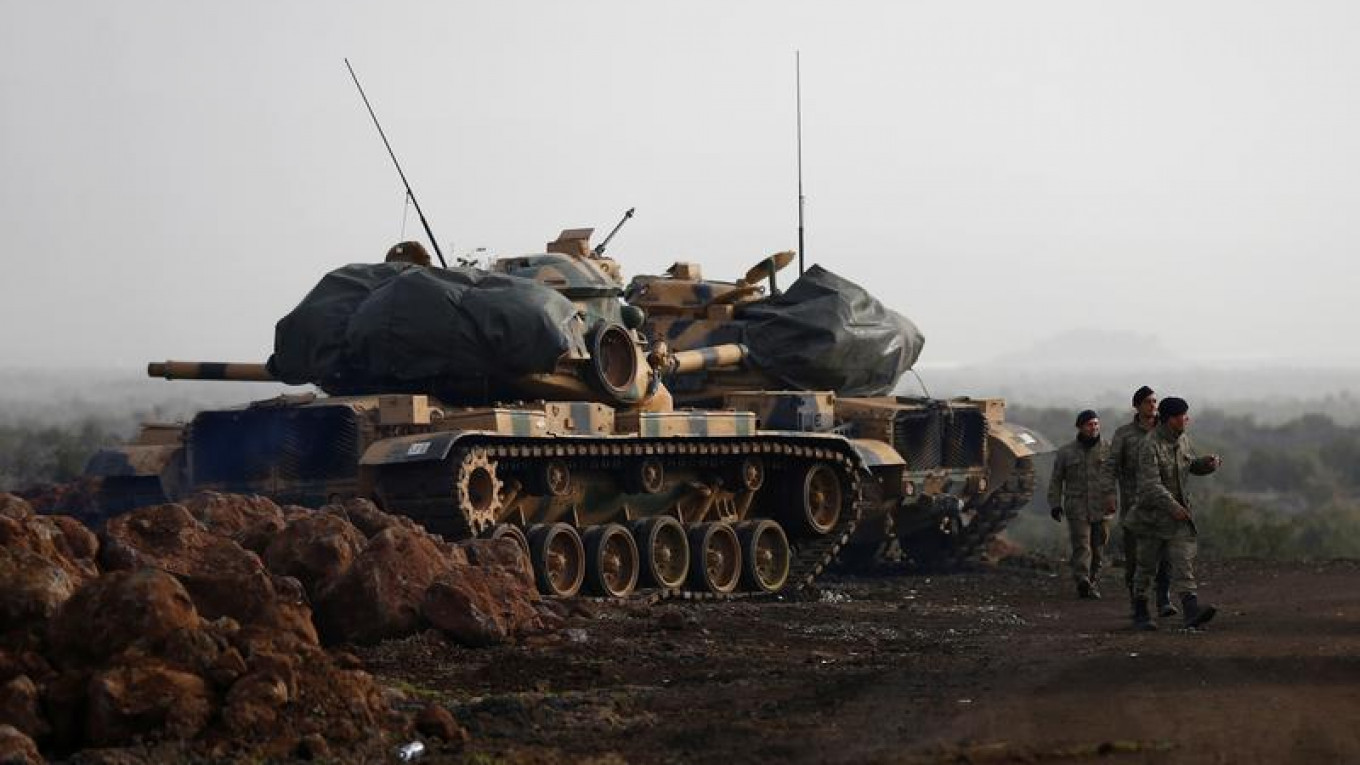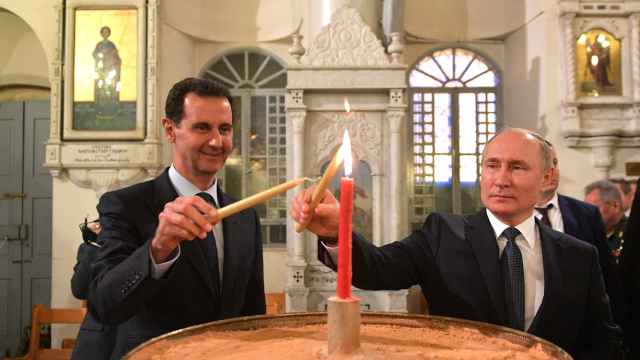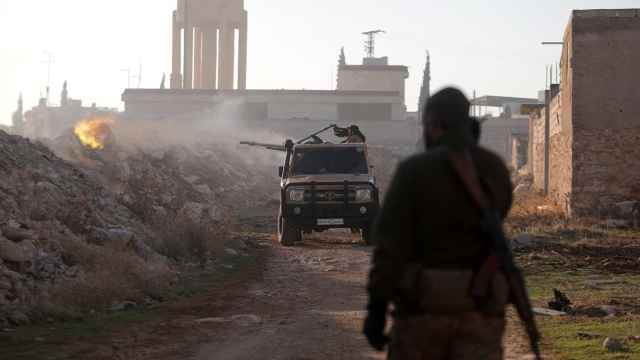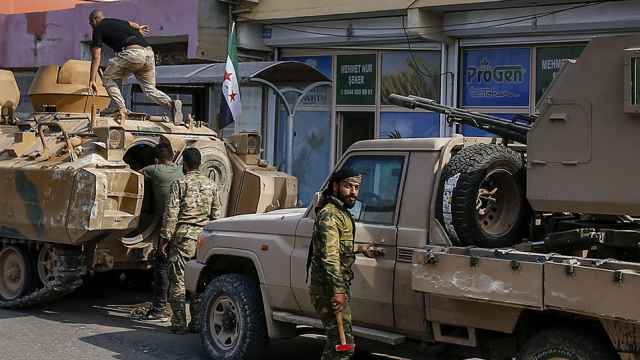(Bloomberg) — It’s only been a month since Russian President Vladimir Putin made a flying visit to Syria to declare victory in the civil war he helped turn around. Winning the peace — or even preserving it — already looks like a huge challenge.
Turkey’s unfolding attack on Kurdish militias just south of its border is, like almost everything that happens in Syria now, Putin’s problem. Russia’s army helped Bashar al-Assad wrest back control of much of his country.
Phase two of the plan was to shift the contest from military to diplomatic ground, and legitimize Assad’s rule. Those efforts are foundering.
Western-backed opposition groups won’t join peace talks hosted by Russia.
So Putin’s Syrian congress in the Black Sea resort of Sochi next week, trumpeted as the moment when the country’s main factions would take a stride toward settling its future, could turn into an assembly of Assad allies talking among themselves.
Inside Syria, Russian soldiers have faced risks all along — but this month brought a new one, when a swarm of satellite-guided drones attacked air and naval bases.
The raid was foiled, and its perpetrators remain a mystery. Russia pointed the finger at the U.S., which denied involvement.
‘Major escalation’
Most urgent is Turkey’s intervention, which threatens to open a new front in a conflict Russia is trying to end. It was a diplomatic coup for Putin last year when Turkish President Recep Tayyip Erdogan signed up to his plan to stabilize Syria.
But Russia sees the Syrian Kurds, who control large territories near the Turkish border, as a potential ally and key part of any settlement.
Erdogan sees them as a terrorist menace — one he’s vowed to destroy. And yesterday Erdogan launched a ground offensive, as Turkish forces advanced to seize the Kurdish-held town of Afrin in northwest Syria amid an air and artillery bombardment.
“The Turks are making things a lot more difficult,” said Irina Zvyagelskaya, a Middle East expert at the state-funded Institute of Oriental Studies.
“It’s already very tough, as we try to push forward the peace process, when Assad is being unconstructive and the opposition groups are refusing to take part. If there’s also a major military escalation, we’ll find ourselves in a very serious situation.”
When Putin sent troops into Syria in 2015, his U.S. counterpart Barack Obama predicted they’d end up in a quagmire.
It didn’t quite turn out that way: With a relatively limited force, Russia achieved its main goal.
And analysts point out that whatever the difficulties facing Putin now, they’re not on the scale that a much larger American force encountered in Iraq after toppling Saddam Hussein.
Still, there’s no quick fix in sight. Turkey’s incursion is one reason — and the U.S. decision to stay in Syria after the defeat of Islamic State is another.
Not going home
Officially, there are about 2,000 American troops in Syria, embedded with the Kurdish fighters who control about one-quarter of the country.
They’ll be there for the foreseeable future, Secretary of State Rex Tillerson said last week, to counter Assad and his allies as well as the remnants of Islamic State. The U.S. said it will help the Kurds create a 30,000-strong security force.
Turkey angrily condemned those plans, though its current operation is targeting Kurdish areas where there are no American soldiers. Russia accuses the U.S. of partitioning Syria instead of helping negotiate a settlement that would include the Kurds.
The American presence is “one of the most destabilizing issues,” said Ayham Kamel, head of Middle East and North Africa at Eurasia Group.
“It’s very difficult to imagine’’ that Assad’s government will accept a U.S.-controlled enclave in the long run, he said – and even if it might, a key Syrian ally probably won’t: “The Iranian regime will push it toward a conflict.’’
Turkish and U.S. objections will likely keep key Kurdish players away from Sochi.
The opposition-in-exile, whose leaders have been touring Western capitals this month, has other reasons.
Russia set unacceptable preconditions, including that there should be “no mention of Assad or of a political transition,” said Yahya al-Aridi, a spokesman for the main umbrella group.
‘Better not come’
The Kremlin says that the summit will go ahead, and that the more than 1,500 invitees represent a majority of opinion inside Syria.
Putin’s Syria envoy, Alexander Lavrentiev, told the state-run Sputnik news service that work on a new constitution may get under way. “If they want to use the Sochi venue in order to make another call for getting rid of Bashar al-Assad, I think they had better not come,’’ he said of the opposition.
“Clearly these people advocate continued military action.”
Russia is right that “the balance of power is shifting away” from the exiled opposition, which is largely based in Saudi Arabia, Eurasia’s Kamel said. Its armed wing controls practically no territory inside Syria.
But the exiles hold one trump-card, as the sole opposition bloc represented at United Nations-sponsored peace talks.
Russia has sought to impose an agreement in Sochi, then get an official seal of approval in Geneva, said Maxim Suchkov, an analyst at the Russian government-affiliated Valdai International Discussion Club who edits Al-Monitor’s Russia coverage.
The exiles can “torpedo the process.”
‘Same conundrum’
Western powers have another lever to maintain their drive to get rid of Assad.
An estimated $300 billion is needed to rebuild the war-shattered country. The U.S. and its allies will “withhold reconstruction aid to regime-held areas” as long as Assad is around, Acting Assistant Secretary for Near East Affairs David Satterfield told Congress Jan. 11.
There’ll be “no certification of victory, either for Moscow or the regime,” he said.
All this leaves Putin in a difficult spot.
“Russia’s still dealing with the same conundrum and has no idea how to solve it,” said Yury Barmin, senior Middle East analyst at the Russian International Affairs Council, a research group set up by the Kremlin.
“No one is saying that the war will end this year and the political settlement will kick in —it will take years.’
A Message from The Moscow Times:
Dear readers,
We are facing unprecedented challenges. Russia's Prosecutor General's Office has designated The Moscow Times as an "undesirable" organization, criminalizing our work and putting our staff at risk of prosecution. This follows our earlier unjust labeling as a "foreign agent."
These actions are direct attempts to silence independent journalism in Russia. The authorities claim our work "discredits the decisions of the Russian leadership." We see things differently: we strive to provide accurate, unbiased reporting on Russia.
We, the journalists of The Moscow Times, refuse to be silenced. But to continue our work, we need your help.
Your support, no matter how small, makes a world of difference. If you can, please support us monthly starting from just $2. It's quick to set up, and every contribution makes a significant impact.
By supporting The Moscow Times, you're defending open, independent journalism in the face of repression. Thank you for standing with us.
Remind me later.






